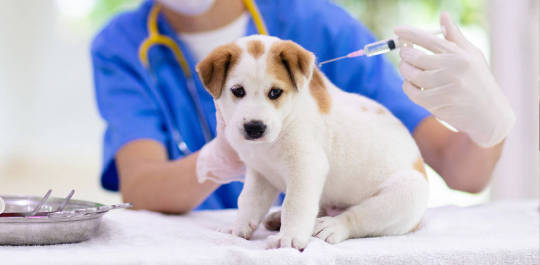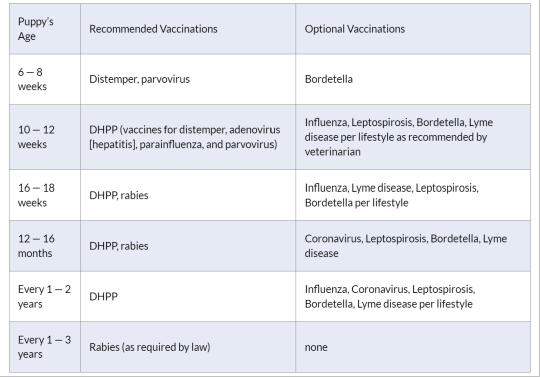#puppy vaccines
Explore tagged Tumblr posts
Text
First-Year Puppy Vaccinations

When you bring that fuzzy ball of puppy energy into your home, you know right away that your new puppy depends on you for, well, everything. It’s up to you to give your new puppy all the care they need every day. It can be a little intimidating — your puppy needs the best puppy food, plenty of attention, puppy training, puppy-safe toys, puppy socialization, a comfortable place to sleep, and proper veterinary care. And that includes making sure to schedule puppy shots throughout your puppy’s first year.
Which Shots Do Puppies Need?
Going to the vet over several months for a series of puppy vaccinations—and then for boosters or titers throughout your dog’s life—may seem inconvenient, but the diseases that vaccinations will shield our puppies and dogs from are dangerous, potentially deadly, and, thankfully, mostly preventable.
We read about so many different dog vaccinations, for so many different illnesses, that it can sometimes be confusing to know which vaccinations puppies need and which puppy shots are important but optional. Here is an overview of the diseases that puppy vaccinations will help your pet avoid.
Bordetella Bronchiseptica
This highly infectious bacterium causes severe fits of coughing, whooping, vomiting, and, in rare cases, seizures and death. It is the primary cause of kennel cough. There are injectable and nasal spray vaccines available.
If you plan on boarding your puppy in the future, attending group training classes, or using dog daycare services, often proof of this vaccination will usually be required.
Canine Distemper
A severe and contagious disease caused by a virus that attacks the respiratory, gastrointestinal (GI), and nervous systems of dogs, raccoons, skunks, and other animals, distemper spreads through airborne exposure (through sneezing or coughing) from an infected animal. The virus can also be transmitted by shared food and water bowls and equipment. It causes discharges from the eyes and nose, fever, coughing, vomiting, diarrhea, seizures, twitching, paralysis, and, often, death. This disease used to be known as “hard pad” because it causes the footpad to thicken and harden.
There is no cure for distemper. Treatment consists of supportive care and efforts to prevent secondary infections, control symptoms of vomiting, seizures and more. If the animal survives the symptoms, it is hoped that the dog’s immune system will have a chance to fight it off. Infected dogs can shed the virus for months.
Canine Hepatitis
Infectious canine hepatitis is a highly contagious viral infection that affects the liver, kidneys, spleen, lungs, and the eyes of the affected dog. This disease of the liver is caused by a virus that is unrelated to the human form of hepatitis. Symptoms range from a slight fever and congestion of the mucous membranes to vomiting, jaundice, stomach enlargement, and pain around the liver. Many dogs can overcome the mild form of the disease, but the severe form can kill. There is no cure, but doctors can treat the symptoms.
Canine Parainfluenza
This is one of several viruses that can contribute to kennel cough.
Coronavirus
The canine coronavirus is not the same virus that causes COVID-19 in people. COVID-19 is not thought to be a health threat to dogs, and there is no evidence it makes dogs sick. Canine coronavirus usually affects dogs’ gastrointestinal systems, though it can also cause respiratory infections. Signs include most GI symptoms, including loss of appetite, vomiting, and diarrhea. Doctors can keep a dog hydrated, warm, and comfortable, and help alleviate nausea, but no drug kills coronaviruses.
Heartworm
When your puppy is around 12-to-16 weeks, talk to your vet about starting a heartworm preventive medication. Though there is no vaccine for heartworm in dogs, it is preventable with regularly administered heartworm medication that your veterinarian will prescribe.
The name is descriptive — these worms lodge in the right side of the heart and the pulmonary arteries (that send blood to the lungs), though they can travel through the rest of the body and sometimes invade the liver and kidneys. The worms can grow to 14 inches long and, if clumped together, block and injure organs.
A new heartworm infection often causes no symptoms, though dogs in later stages of the disease may cough, become lethargic, lose their appetite or have difficulty breathing. Infected dogs may tire after mild exercise. Unlike most of the conditions listed here, which are passed by urine, feces, and other body fluids, heartworms are transmitted by mosquitoes. Therefore, diagnosis is made via a blood test and not a fecal exam.
Kennel Cough
Also known as infectious tracheobronchitis, kennel cough results from inflammation of the upper airways. It can be caused by bacterial, viral, or other infections, such as Bordetella and canine parainfluenza, and often involves multiple infections simultaneously. Usually, the disease is mild, causing bouts of harsh, dry coughing; sometimes it’s severe enough to spur retching and gagging, along with a loss of appetite. In rare cases, it can be deadly. It is easily spread between dogs kept close together, which is why it passes quickly through kennels. Antibiotics are usually not necessary, except in severe, chronic cases. Your vet may prescribe a dog-safe cough suppressant to help your dog (and you) get some rest, and some dog-safe throat soothers can help make a dog more comfortable.
Leptospirosis
Unlike most diseases on this list, Leptospirosis is caused by bacteria, and some dogs may show no symptoms at all. Leptospirosis can be found worldwide in soil and water. It is a zoonotic disease, meaning that it can be spread from animals to people. When symptoms do appear, they can include fever, vomiting, abdominal pain, diarrhea, loss of appetite, severe weakness and lethargy, stiffness, jaundice, muscle pain, infertility, kidney failure (with or without liver failure). Antibiotics are effective, and the sooner they are given, the better.
Lyme Disease
Unlike the famous “bull’s-eye” rash that people exposed to Lyme disease often spot, no such telltale symptom occurs in dogs. Lyme disease (or borreliosis) is an infectious, tick-borne disease caused by a type of bacteria called a spirochete. Transmitted via ticks, an infected dog often starts limping, his lymph nodes swell, his temperature rises, and he stops eating. The disease can affect his heart, kidney, and joints, among other things, or lead to neurological disorders if left untreated. If diagnosed quickly, a course of antibiotics is extremely helpful, though relapses can occur months or even years later.
Talk to your vet about when your puppy will be old enough for tick preventatives. Once your puppy is old enough, keep your dog on tick preventative medication, topicals, or wearables to help stop ticks from biting in the first place.
Parvovirus
Parvo is a highly contagious virus that affects all dogs, but unvaccinated dogs and puppies less than four months of age are at the most risk to contract it. The virus attacks the gastrointestinal system and creates a loss of appetite, vomiting, fever, and often severe, bloody diarrhea. Extreme dehydration can come on rapidly and kill a dog within 48-to-72 hours, so prompt veterinary attention is crucial. There is no cure, so keeping the dog hydrated and controlling the secondary symptoms can keep him going until his immune system beats the illness.
Rabies
Rabies is a viral disease of mammals that invades the central nervous system, causing headache, anxiety, hallucinations, excessive drooling, fear of water, paralysis, and death. It is most often transmitted through the bite of a rabid animal. Treatment within hours of infection is essential, otherwise, death is highly likely. Most states require regular rabies vaccinations. Check with your vet about rabies vaccination laws and requirements in your area.
Talk with your veterinarian about more information and guidance on necessary and optional vaccinations.
Puppy Vaccination Schedule
The first thing to know is that there is not just one puppy vaccination schedule for all dogs. Factors such as which part of the country you live in, and your dog’s individual risk factors will come into play. Some dogs do not need every vaccine. This decision is between you and your veterinarian. Always discuss puppy vaccinations at your regularly scheduled appointments.
That said, here is a generally accepted guideline of the puppy vaccination schedule for the first year.

How Much Do Puppy Vaccinations Cost?
How much puppy vaccinations will cost depends on several factors. Where you live is a big one: Veterinarians in crowded and expensive urban areas will generally charge more than a rural vet in a small town. You may be able to find low-cost clinics providing rabies vaccinations sponsored by your local municipal government. But no matter what the range in costs, some vaccines, such as the “core vaccines” and rabies, are necessary.
The average cost can average around $75—100. These will include the core vaccines, which are administered in a series of three: at 6-, 12-, and 16 weeks old.
The core vaccines include the DHLPP (distemper, hepatitis, leptospirosis, parvo, and parainfluenza). Your pup will also need a rabies vaccination, which is usually around $15—20. (Some clinics include the cost of the rabies vaccination.)
Often animal shelters charge less for vaccines — approximately $20 — or are even free. If you acquired your dog from a shelter, he would most likely have been vaccinated, up until the age when you got him.
The initial puppy vaccination costs during the first year are higher than during adulthood.
Vaccinations for Adult Dogs: Boosters and Titers
There is a difference of opinion about having your adult dog vaccinated every year. Some vets believe too many vaccinations in adult dogs pose health risks. But others disagree, saying that yearly vaccinations will prevent dangerous diseases such as distemper. Talk with your vet to determine what kind of vaccination protocol works for you and your dog.
Many dog owners opt for titer tests before they administer annual vaccinations. Titer tests measure a dog’s immunity levels, and this can determine which, if any, vaccinations are necessary. One key exception to this is rabies: a titer test is not an option when it comes to the rabies vaccine. This vaccination is required by law across the United States. Your vet can tell you the schedule for your particular state, with boosters often lasting three years.
And it’s all worth it. For your effort and care your puppy will lavish you with lifelong love in return. This critical first year of her life is a fun and exciting time for both of you. As she grows physically, the wonderful bond between you will grow, too.
#puppy vacinations#puppy vaccines#puppy shots#puppy shots schedule#dog vaccinations#dog health#puppy health
5 notes
·
View notes
Text

How can you say no to those eyes?
#someone got his first vaccine !#he was beimg very brave about it#being*#dog#dogblr#dogs#english toy terrier#puppy#puppies#terrier#terriers#cute#dogs of tumblr#pretty boy remi#12 weeks
72 notes
·
View notes
Note
Hi! I know that it's important to socialize a puppy well with both people and other dogs. But I also know you shouldn't let a puppy in contact with other dogs or walk it in areas where other dogs go before they have been fully vaccinated to prevent diseases.
Does that mean the socialization starts only after they get all their vaccines? Or is there something I'm missing here? Also because I thought the early periods of a dog's life were especially important with regards to socialisation.
Thanks!
Question tax: who was the cutest puppy you've seen recently?
vet-and-wild here.
It is no longer recommended to wait to start socializing a puppy until after their vaccine series is done, but you do need to take precautions. The reason is that there is a critical socialization window right in the middle of this time that ends around 16 weeks. That doesn't mean they can't learn or be socialized outside of this time, but the experiences they have in this time period are very important for setting the stage to how they react to stimuli in the future. Puppies who are improperly or under socialized during this period are much more likely to have behavioral issues as adults.
It's important to also understand why we booster puppy vaccines so many times. Depending on what kind of vaccines or disease exposure the mother had, this same time period is when the maternal antibodies the puppy received will be lost. Those maternal antibodies protect the puppy, but also interfere with vaccine efficacy. We don't know when they will lose the protection from those maternal antibodies, so we booster through this period to make sure they are protected. So just having 1 or 2 vaccines wouldn't guarantee that the puppy was fully protected.
The compromise is to avoid areas of potentially higher risk during this time. Dog parks, for example, may be full of dogs of unknown vaccine status and could have wildlife around that may carry parvo, distemper, etc. However, a puppy class at a reputable training facility only allows vaccinated dogs and should have disinfection protocols in place to help reduce the risk of disease spread. Basically, your puppy doesn't need to live in a bubble during this period, but you should use reasonable caution. Also keep in mind that socialization doesn't necessarily mean meeting a bunch of people or dogs! It just means positive exposure. Sitting out in your yard and practicing appropriate reactions to strange dogs walking by is socialization. Playing videos with thunder, fireworks, etc and getting the puppy used to it is socialization. Getting used to the car, medical handling, grooming, strangers coming in the house, all of that is part of socialization.
I tried to think of the cutest puppy I've seen but I'm going to be lame and say they're all cute cuz I keep changing my mind!
296 notes
·
View notes
Note
I understand if you don't feel comfortable answering this because IIRC Stellina's breeder had some strict requirements in her contract with you... do you know how enforceable breeder contracts are? Asking as someone who works in a vet clinic and has seen contracts stipulating how many vaccines/when to give them or they are "void"
one of the reasons i went with stellina's breeder is actually because their contract didn't have strict requirements - it had a lot of suggestions, but they were all worded like "we strongly suggest following XYZ vaccine protocol" or "we recommend using ABC for tick preventatives," but nothing that was worded like "you MUST do (this thing)" (except i think that i must contact them if i ever rehome stellina, which i think is reasonable). i genuinely don't care if a breeder makes suggestions in their contract, but i would never sign one that ever states that feeding a certain food, or not vaccinating, is mandatory, or that not doing so voids your health guarantee. hell no, fuck that. my dog, not yours.
to answer your question: i don't honestly know how enforceable they are, but i'd guess it kind of depends on the specific breeder. i feel like i've heard stories about breeders going after puppy buyers on grounds of broken contracts, but i rarely hear about them actually enacting legal consequences (like suing, or repossessing dogs). i think the consequences are more often that you'll be blacklisted from a community/breed, as opposed to legal stuff or literally losing your dog. my impression has been that breeder contracts are more a show of good faith than anything else - but maybe i'm wrong, genuinely idk.
so: i think they're technically legally enforceable, but doing so requires a lot of legwork that most people arent willing or able to put in.
#am i talking out my ass? perhaps#if you have contradictory experience please share im happy to be proven wrong#also i would bet like my entire salary that youre referring to 'if you give your puppy a lepto vaccine I WILL KILL YOU' type of clauses
41 notes
·
View notes
Text


Sabine and I are officially a hit with the elderly ladies in town ✨
#She has finished her vaccinations!!! So today we celebrate ✨#Sabine was such a good girl and said hello to many friendly elderly people in town and they all said she was lovely#So her ego is massive rn. Rightfully so.#I have my fishnets on bc its fishnet Friday and it is perfectly reasonable baby-walking attire when I put clothes on top#satans knitwear#Pupdate (puppy update)
62 notes
·
View notes
Text

I forgot to do a Week 4 Recap post this week but she's crushing it.
#dogblr#rory borealis#she's honestly turning into such a cool little dog#we focused more on cooperative care and conditioning this week#since it was xmas so i wasnt motivated to go out#anyway we started pivots balancing exercises and proper positioning for square sits#also worked on combing clipping and nail grinding#this week's victory was really good name recognition and learning to ask for things (food training outside snuggles)#next week's goal is more neutrally around pinecone and starting on polite greetings (all four feet on the floor)#she has her last set of vaccines and starts one of her puppy classes and has a puppy grooming session#im excited to see what she learns from them
51 notes
·
View notes
Text
Yesterday, I got a flu shot and a covid booster, and the nurse put a Scooby Doo bandaid on. Just now, I did my Enbrel injection and put a Hello Kitty bandaid on. Now I'm a little worried that there might be trouble because of Scoob's dislike of cats. Hopefully they're separated enough
7 notes
·
View notes
Text
That cdc ruling is legit keeping me up at night. The more I read on it the more I feel all my future plans slipping through my fingers.
#dogblr#legit just crying#and crying#and idk what to do#my dogs are my kids my life my passion#my breeder is my friend my mentor#not to mention the ruling is super unclear is it considers Canadian vaccines valid to the ruling at ALL#so like…any hopes of a dog period not even a puppy just. whoosh. slipping through my fingers
20 notes
·
View notes
Text

Daily excerpt from today's writing, chapter 9 of Underline the Gold:
‘There was just a day where it felt like we were fighting with your body,’ Anton said, his voice breaking. Oh, my love, Flitmouse thought, rubbing his side and frowning. ‘Temsen said your organs have really been through it. With the… With the anorexia. And I think maybe a lot of other things in your past. Your body is a lot weaker than an omega’s should be at your age. I didn’t realise how fragile you were. I don’t think Temsen did, and he’s seen the test results.’ ‘But I’m… But I’m still here, aren’t I?’ ‘Do you- Do you even want to be here?’ Flitmouse was silent for a time, and then he sighed. ‘If it’s with you, Anton, then…yes, I might want to be here.’ Anton looked up at him, though the dark room made eye contact nearly impossible. ‘Really?’ ‘Don’t tell anyone else I told you, my dear. It’s a secret. Just a secret, for now. It’s- It’s terrifying to think this way. I don’t suddenly want to live, I haven’t- I haven’t suddenly realised it’s a good thing. I just want to selfishly spend more time with you.’
#daily excerpt#underline the gold#underline the rainbow#alois flitmouse#anton valenosk#cw anorexia#cw suicidal ideation#and now it's time to feed a very tired puppy#who just had his third vaccine#i didn't expect to be writing 2500 words today!#but here we are!
29 notes
·
View notes
Text
sometiems im Like thinking to msyelf-> i got to stop embarrassing msyelf in peopels tags by being crazy all the time but like. This feeling is never strong enough to get me to stop. Whcih is completely useless
#can’t stop my puppy dog love for anime girls can’t stop no matter how much vaccines I take#trust me my personaltwt is way worse#at all times I’m capable of far worse#txt
2 notes
·
View notes
Text

EVERYONE CROSS YOUR FINGERS THAT I ACTUALLY GET TO KEEP ONE OF THESE STUMPY PUPPIES!!!
#genuinely nothing can be as bad as the last dog i almost got#tw animal death but like bruh tf you mean you left him outside and coyotes got him???? wgat!!#anyways this person seems alot more trustworthy about the puppies. like they're vaccinated and dewormed n shit#DROP NAME SUGGESTIONS PLEASE THEY'RE ALL EITHER BLACK AND WHITE OR BROWN AND WHITE🙏🙏🙏#the lady said they're border collie husky mixes#they've got other shit in there too but thats mostly what they are
9 notes
·
View notes
Text
(gripping the sides of my head) Pick-ups tonight Will Not Kill Me. They will Not.
#ramblings#theres only supposed to be 2 which isnt actually bad but like. OJNDFGNKG ok its not them#but there are these 3 puppies isolated in one of the kennel wings that cannot go out back/ be near the other dogs because#theyre not yet fully vaccinated i THINK ? and they were only marked up til today and i realllllyyy dont wanna have to run pickups on them#not that ill Die but its like. grimaces . itll be a Pain and i kinda just feel way too stressed rn idk idkkkk#theyve been here like. two ? other times now ? and both other times they only left after the weekend was up#so theres a chance they wont be picked up tonight and i hope thats the case#ill survive if they are im just. exploding gif
5 notes
·
View notes
Text
It has been 5 days and I have forgotten how to speak in my normal human voice.
#This was not entirely a fluke!! She does respond to Sabine already!! Even from another room in the house!!#Probably just because she is so curious about what's going on everywhere but I'm proud of her anyway#She slept on my neck again last night and woke me up by trying to give me some new ear piercings 😂#Forget getting ur ears pierced at Claires babes!! Get a little puppy with shark teeth to do it for free!!#Not hygienic or accurate but thats hardly different from Claires anyway 😂#I feel so so lucky to get to love such creatures. Baby belle would be trying to teach this one all her sneaky tricks already#I remember forgetting how to human voice properly when we got Big baby Rosie as well. Puppy talk is infectious fr#I finally scraped together the coin together to sort out her microchip! Next up I gotta sort her followup vaccinations! Phonecalls are scary#Daily/Regular pupdate
21 notes
·
View notes
Text
Cody aced his first doggo meeting with the behaviourist’s dog! And his second doggo meeting with a random huge lovely Staffie called Odin who was built like a sack of cement. And his third and forth doggo meeting with a wee Staffie and slightly harrumphy French Bulldog. First trip to the park was officially a success!
And now he’s slept for about four hours so far, in his crate with the fan on, with his sore leggies stretched out in the air like so

#rescue pup#*pops ‘he’s not aggressive’ streamers*#was a little shouty in his excitement at first#but then chilled out massively#and has the go-ahead for puppy class!#(yeah the meeting was supposed to happen last week)#(but her dog got overwhelmed the day before)#(so she decided it best to give her girl the day off)#(and this meant he’d be vaccinated enough to do it in the park)
14 notes
·
View notes
Text
if i disappeared for a few days, pls know i've been taking care of a land cloud.
#.ooc#[ not me spending the whole day visiting pet shops to get things ready for him#from food to toys & tools. also some treats even tho he can't have any yet until he's a bit older#it's been a while since i take care of a pupper HLKJHHJLK my current doggo is old and i love him to bits#but puppies need much more attention esp since kumo is only like 2 months old#need to get him vaccinated and prepare some space for him#and need to teach him basic commands and manners too#HJKHLHJLK IT'S GOING TO BE QUITE A BIT OF WORK BUT I'M JUST SUPER EXCITED TO HAVE HIM ]
17 notes
·
View notes
Text




Oh, yeah! I haven't posted her yet here, but @martias7 and I got a puppy! Meet Diana! She is 3.5 months old, so we've had her for about two months and she is Terminally Puppy.
#Diana Carmen#puppy#Coton de Tulear#dog#she is not feeling so great today :(#but she gets her last vaccine on Monday!
9 notes
·
View notes